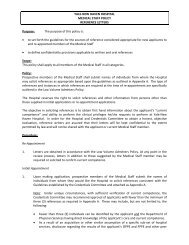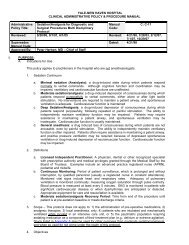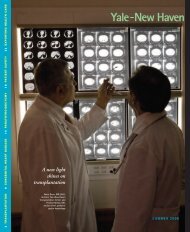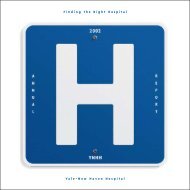Nursing Update 2009 - 2010 - Yale-New Haven Hospital
Nursing Update 2009 - 2010 - Yale-New Haven Hospital
Nursing Update 2009 - 2010 - Yale-New Haven Hospital
- TAGS
- nursing
- haven
- www.ynhh.org
Create successful ePaper yourself
Turn your PDF publications into a flip-book with our unique Google optimized e-Paper software.
therapeutic hypothermia protocol.<br />
“This truly was a collaboration among<br />
cardiology, critical care medicine, emergency<br />
and neurology services and allows<br />
us to start treatment without delay,” said<br />
unit-based educator Prasama Sangkachand,<br />
RN, service line educator, Heart<br />
and Vascular Center. “The Arctic Sun is<br />
technologically much farther advanced<br />
and easier to use when compared with<br />
traditional body cooling-methods. Most<br />
important, it allows us to spend more<br />
time on patient care – and less on the<br />
equipment.”<br />
Sarah Gillespie (left), RN, is a nurse in the Cardiac Intensive Care Unit who also volunteers for the hospital’s<br />
Listen and LeaRN program. Here she takes a blood pressure reading of a visitor at the hospital’s annual<br />
Community Health Fair where nurses and other health professionals provide free health screenings and<br />
information to greater <strong>New</strong> <strong>Haven</strong> area residents who come to the popular event.<br />
ICu nurses trained for<br />
mArs therapy<br />
In October <strong>2009</strong>, YNHH became the<br />
first U.S. hospital to offer Molecular<br />
Adsorbents Recirculating System<br />
(MARS) therapy – a form of artificial liver<br />
support. MARS is FDA-approved for the<br />
treatment of drug overdose and poisonings.<br />
The patient is simultaneously connected<br />
to a continuous renal replacement<br />
therapy machine and the liver dialysis<br />
machine. Often described as bridge<br />
therapy, MARS therapy may lessen the<br />
morbidity and mortality associated with<br />
liver failure because it buys precious time<br />
to locate a donor liver or for the liver to<br />
regenerate.<br />
Specially trained critical care nurses in<br />
the Medical Intensive Care Unit (ICU) and<br />
Surgical ICU initiate the MARS therapy<br />
while working with an interdisciplinary<br />
team consisting of staff from hepatology,<br />
nephrology and pharmacy.<br />
“Our first patient’s positive outcome<br />
provides a glimpse into a new and<br />
exciting future for the treatment of liver<br />
failure,” said Dawn Cooper, RN, service<br />
line educator, MICU. ■<br />
Y A L e - n e w h A V e n h o s P I T A L 1 3


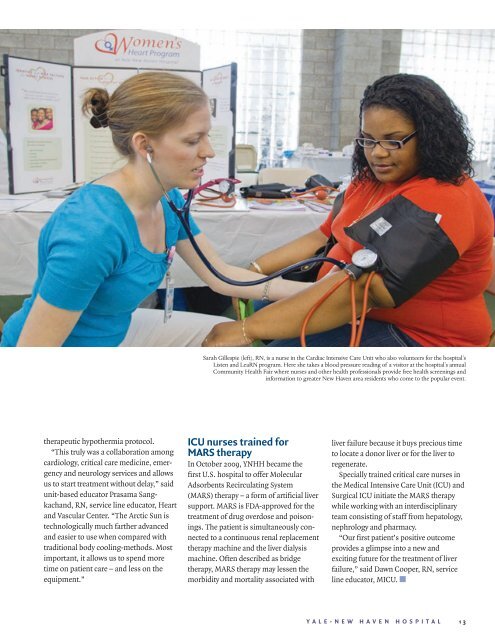


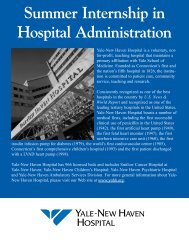
![Annual Report Donor Listings [pdf] - Yale-New Haven Hospital](https://img.yumpu.com/49673575/1/190x245/annual-report-donor-listings-pdf-yale-new-haven-hospital.jpg?quality=85)

